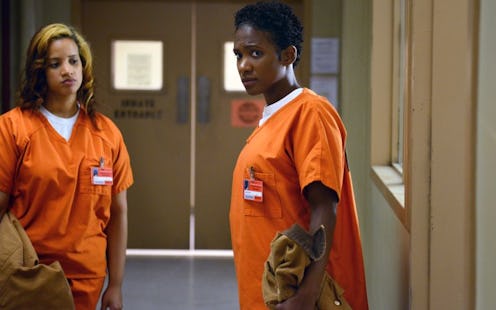News
Should Felons Get To Vote?

Attorney General Eric Holder is calling on states to restore voting rights to felons following their release from prison. In a speech on criminal justice reform at Georgetown University today, Holder called voting restrictions on former felons "unnecessary and unjust," arguing that they actually increase rates of recidivism by continuing to isolate and stigmatize former prisoners. "It is time to fundamentally reconsider laws that permanently disenfranchise people who are no longer under federal or state supervision," Holder said.
Holder does not have the authority to compel states to change their laws on felons' right to vote, but his attention to the issue may drive state legislators to revisit these laws. He has already had some similar success with curbing mandatory minimum sentences for drug-related offenses.
In his speech, Holder quoted figures that an estimated 5.8 million Americans are currently disenfranchised because of current or previous felony convictions. Approximately 38 percent of those disenfranchised people are black.
Throughout America, 2.2 million black citizens – or nearly one in 13 African-American adults – are banned from voting because of these laws. In three states – Florida, Kentucky, and Virginia – that ratio climbs to one in five. These individuals and many others – of all races, backgrounds, and walks of life – are routinely denied the chance to participate in the most fundamental and important act of self-governance. They are prevented from exercising an essential right. And they are locked out from achieving complete rehabilitation and reentry – even after they’ve served the time, and paid the fines, that they owe.
Holder dated felony disenfranchisement back to the nineteenth century, when such measures were used to quell the voting powers of African Americans, especially in the South, where 90 percent of the prison population was black.
"The impact of felony disenfranchisement on modern communities of color remains both disproportionate and unacceptable," Holder said. According to the Justice Department, there are currently 11 states that have strict restrictions on voting rights for felons, even after they have served their sentence in a correctional facility and are no longer on parole. As part of a series on poverty and democracy in the US, the Atlantic explores the issue of whether felons should be able to reclaim the right to vote. It notes:
Felon disenfranchisement is not randomly distributed across the population. The large majority of past and present felons who have lost the right to vote were raised and continue to live in poverty. According to an Urban Institute study, nearly eight in 10 incarcerated fathers earned poverty-level incomes of less than $2,000 in the month prior to their incarceration, and 40 percent did not have a full-time job—six times the overall rate of poverty at the time.
America's prison population has doubled in the past 20 years — despite a decline in crime rates. This shocking figure, coupled with the news that most correctional facilities are running at 136 percent capacity, has helped bring prison reform to the forefront in Congress, with both Democrats and Republicans alike campaigning for system overhaul.
On the issue of felon disenfranchisement, Holder's position is strongly supported by Kentucky Republican Sen. Rand Paul. In a speech in Louisville last September, he said restoring the right to vote "dwarfs all other" election-related issues.
With Paul expected to make a bid for the Republican nomination in 2016, there's a very good chance that this could become a hot-button issue for the next election.
Image: Orange Is The New Black/Netflix